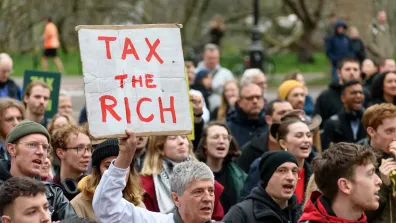Trade and Covid-19: privatisation, big pharma and ISDS

These are of course important parts of the story about the pandemic and trade. But we must also look at the role that trade plays in a world where:
-
people are dependent on health services crippled by austerity and privatisation
-
we are years behind finding a vaccine because the pharmaceutical industry is not interested in making products that aren’t profitable
-
countries face a potential new wave of ISDS cases because of measures they take to tackle the crisis.
Privatisation
The privatisation of public services, including health, has been an objective of ‘free trade’ agreements over the last few decades all over the world. It has been a disaster.
In the UK, increasing amounts of NHS funding going to profit-making companies has coincided with a time when healthcare spending per person has been declining. Privatisation is directly undermining quality of care. Today, the UK has fewer doctors and nurses per head than any European economy bar Poland.
This is a pattern reflected across the globe.
A study identified privatisation in South Africa – the most unequal country in the world – as the ‘primary cause’ of the deprivation of most South Africans’ access to health care.
In the US, where the coronavirus death toll exceeds 50,000 people, a profit-driven approach to health has resulted in the most expensive and least effective system in the world. Americans spend much, much more on health care than any other OECD country, and for the privilege they get worse health outcomes, lower life expectancies and fewer hospitals beds.
Health services have been decimated by years of austerity and private-sector looting. An effective response to the Covid-19 crisis must tackle the privatisation of health services, including the NHS, and commit to excluding public services from trade deals.
Although the government has claimed that the NHS is not for sale, experience tells us that these promises are empty. During the negotiation of CETA (the Comprehensive Economic Partnership Agreement), we heard the same thing, but services remained on the table. The UK should insist on ending the use of ‘negative lists’ which force countries to ‘opt out’ rather than ‘opt in’ to services they want to liberalise, and ensure that there are strong ‘carve-outs’ in trade agreements to exclude public services.
Profit over patients
If the pharmaceutical industry actually served the needs of people, we could already have a vaccine – that’s according to leading vaccine expert Dr Peter Hotez. Vaccines are not typically a profitable product, so they are not attractive to develop for an industry that is structured to extract profit from our health systems, societies and bodies.
Companies in ‘the most profitable industry in the world’ use publicly-funded research to develop drugs which they then patent and sell for often exorbitant prices. With Covid-19, there are legitimate fears that if big pharma in just a few countries controls access to vaccines, the will be beyond the reach of poor people – the Global Majority.
These companies lobby for expansive intellectual property rights through trade deals to ensure bigger and bigger profits. Even where trade rules allow countries to produce generic copies of drugs their citizens need, through a provision called ‘compulsory licensing’, big pharma has exerted political pressure and created exemptions to make these rights almost unworkable.
This may be changing. In the last few days, countries have started issuing compulsory licences for a drug being tested for effectiveness in the treatment of Covid-19.
Last week, civil society organisations and health experts called on the UK government to support access to drugs, vaccines and other diagnostic tests to tackle Covid-19 for countries that are currently excluded from access to cheaper imports. The UK government can support access to medicines by issuing compulsory licenses and encouraging other countries to do the same, ensuring that any vaccine developed with public money is made affordable to the NHS as well as lower income countries, and by excluding onerous intellectual property obligations from trade deals.
A wave of new ISDS cases?
Through ISDS (Investor State Dispute Settlement), trade deals give corporations rights to sue governments who regulate in the public interest.
Governments across the world could face a wave of new ISDS cases – companies suing them – for the measures that governments take to to protect life and livelihoods from the threat of coronavirus, such as nationalising hospitals, or closuring factories.
It would not be the first time investors used ISDS to profit from a crisis. In Argentina, after the government sought to address an economic collapse, the government found itself facing over 50 ISDS cases. Argentina was forced to pay out over US$2billion.
Governments must be able to regulate in the interest of their peoples without the risk of predatory arbitration. At a time of crisis, this need is even more acute.
ISDS has no place in our trade deals, during the pandemic or at any other time. The government should withdraw their consent to be sued using ISDS.
A crisis of global inequality
Covid-19 is predicted to have a devastating effect on the Global South. A global recession could push millions more people into extreme poverty, while UN sources have spoken of a famine of ‘biblical’ proportions. In response to possible shortages, some countries are imposing export restrictions on food, pushing up prices for people who are already food-insecure.
Measures which push up food prices must be avoided. This includes stopping unnecessary government stockpiling, and stricter regulation of financial markets, and speculation on food and on financial products related to food.
These are issues of trade, but they are also fundamentally questions about whether our global economy is designed to serve people or to serve shareholders.
As with medicines, corporations seek expansive intellectual property rights in trade deals to privatise seeds and plants. Trade deals should not be used to expand the intellectual property rights of agribusiness at the expense of people and planet.
Focusing on the crisis and stopping toxic trade deals
The ongoing failures to address the crisis, as well as the limitations of a virtual parliament, point clearly to the need for the government to focus on addressing Covid-19 and not divert resources to negotiating new trade deals. This is why we joined with other organisations in calling for the suspensions of a dangerous US-UK trade deal. Given the high risk of a US deal to our NHS, medicine prices, food and farming standards, it would be deeply inappropriate for the negotiations to continue.
The coronavirus pandemic has made clear that trade and its role in shaping our economies needs a serious rethink. It has revealed a broken economic system, which prioritises making money for big business, rather than saving lives and supporting those on the frontlines.
#NoGoingBack means working towards an economy that works for people, not profit. It means transforming the way we approach international trade, in light of its impacts on our health, food, and democracy.
Read more about the Trade Committee’s Inquiry here.
Leah Sullivan
Senior Campaigns Officer – International Trade


